10 networking tips for people who hate it
 Imagine yourself in a large conference room packed with hundreds of specialists with badges on their chests. Flocks of anxious-looking people wander past the tables with snacks filled with cookies and pies. Others - waltz through the maze of thumbs partners, next to which men and women in business attire conjure over neatly laid out advertising brochures and branded pens. Still others are staring at their phones ...
Imagine yourself in a large conference room packed with hundreds of specialists with badges on their chests. Flocks of anxious-looking people wander past the tables with snacks filled with cookies and pies. Others - waltz through the maze of thumbs partners, next to which men and women in business attire conjure over neatly laid out advertising brochures and branded pens. Still others are staring at their phones ...You came to the event personally, although you could then watch it in the notes in your favorite slippers at home or in the subway car on the way to work. You did it for a purpose, didn't you? Chat with some important experts; listen to how similar problems with analyzing big data in Hadoop solve or reduce glitches tracking Google Analytics more experienced specialists; get acquainted with a new potentially interesting startup or journalist, or maybe you yourself - a startup and came to look for useful contacts; spud many new customers; find and motivate future employees. Your task is to leave a positive, lasting impression on the maximum number of people over the next few hours. Already starting to suck under the spoon?
Networking is something between art and the science of building professional relationships, but only a few of us manage to do this naturally. There are many excellent reasons for networking, and most importantly - the more people you meet, the greater your circle of acquaintances and the greater the chances of finding the best customers, partners, employers or employees ... At least in theory.
But many introverts (and there are many among us), large industry events make you feel as if they came for the first time to the first class. “Just smile and introduce yourself!” Mom told you. Yeah, schaz!
')
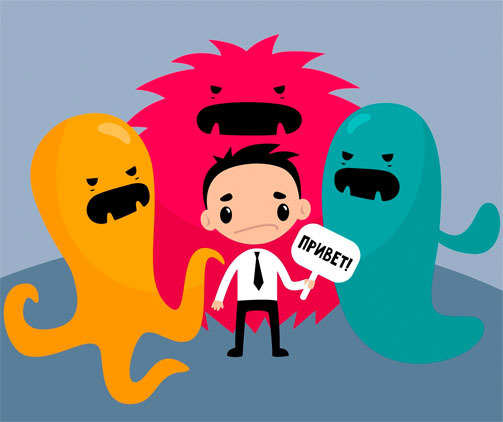
Introverts are masters of thoughtful one-on-one conversations with close people, but it is incredibly difficult for them to sell themselves and their ideas to completely outsiders with the help of carefully rehearsed Elevator Pitch.
What is an Elevator Pitch?
Elevator Presentation (or elevator speech) (Elevator Pitch or Elevator Speech) is a short story about the concept of a product, project or service. The term reflects time constraints - the length of the presentation should be such that it can be fully narrated during the ride on the elevator, that is, about thirty seconds or 100-150 words.
So how do you develop a strong and efficient professional network if you hate networking? Calm, only calm. Doing more than one year of business applications, we ate, probably, a hundred dogs, books and articles on working with business cards, contacts and acquaintances, and therefore we have the honor to tell ten practical and really useful networking tips that even a social phobia can use. By the way, for advanced users, for whom this is not enough, I highly recommend visiting Global Networking Marathon on May 23-25 in the DI Telegraph with a real networking guru.
So.
1: Make yourself cool, but easy-to-understand business cards
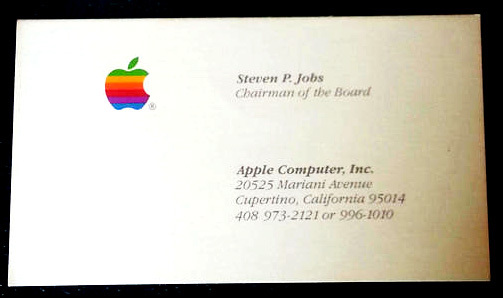
Despite the fact that business cards have been buried for more than a dozen years, this is still one of the most important tools for establishing contacts and continuing communication. If you come to the event without business cards - your networking opportunities fall below the waterline (but still possible, see point 2).
There are a lot of tips to improve their “steepness” and visibility, such as making business cards in the form of coins, seed bags, or three-dimensional cardboard structures, but in fact the business community doesn’t appreciate the cunning business cards with strange fonts and the background image of the planet Earth in technique of impressionism.
This is not necessary





The main thing is that the business card is read and contains all the necessary information. A similar opinion is shared, for example, by the time management guru, Gleb Arkhangelsky .
Recently, more and more people use business card scanners to quickly save information from a business card to phone contacts (for example, our ABBYY Business Card Reader : download on the App Store , download on Google Play ) . Business card scanners can do many other useful things: write notes, assign tasks to a contact, upload business cards to cloud storages, Excel, search for contacts on social networks, etc. If the application with great difficulty "processes" your card - you have problems , since nothing but a negative will not cause a person to reprint the data manually.
What are the "master-hev" requirements for business cards need to be considered. In our experience, these are:
Business Card Requirements
1. Printed on matt thick paper.
2. The design should be as discreet as possible, simple and concise.
3. It is desirable that all important contact information be collected on one side of the business card. The reverse side is better to leave blank for notes that will make the recipient of business cards.
4. When choosing a font, it is better to avoid italics. In contacts it is better to use the same font color everywhere.
5. The background and font should be contrasting, ideally - a white background and a black font. You should avoid combinations of gray background plus dark gray font, green background plus blue font. The background should be uniform.
6. A company logo must be clearly separated from the rest of the information by color and style so that the text with the logo is not confused with the rest of the information.
7. The orientation of the business card is preferably horizontal.
8. For foreign partners - individual English-speaking business cards, not Russian contacts on the one hand, English - on the other.
Here is an example:

2. The design should be as discreet as possible, simple and concise.
3. It is desirable that all important contact information be collected on one side of the business card. The reverse side is better to leave blank for notes that will make the recipient of business cards.
4. When choosing a font, it is better to avoid italics. In contacts it is better to use the same font color everywhere.
5. The background and font should be contrasting, ideally - a white background and a black font. You should avoid combinations of gray background plus dark gray font, green background plus blue font. The background should be uniform.
6. A company logo must be clearly separated from the rest of the information by color and style so that the text with the logo is not confused with the rest of the information.
7. The orientation of the business card is preferably horizontal.
8. For foreign partners - individual English-speaking business cards, not Russian contacts on the one hand, English - on the other.
Here is an example:

What turns out, business card stand out does not work? Well, why. Firstly, you can buy and paste a special NFC tag with your information on the business card.
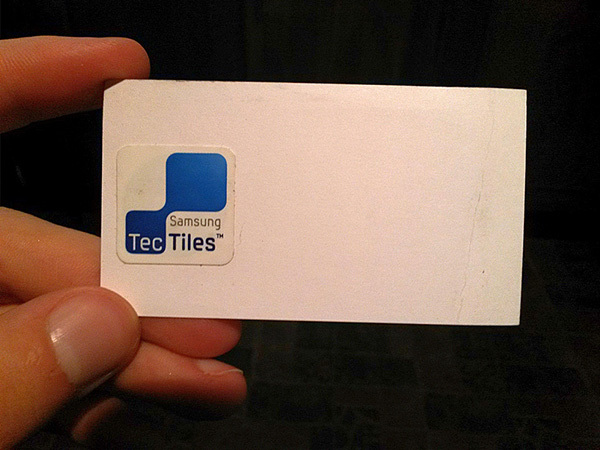
Then the user only needs to bring the phone (Android, WP, Blackberry) to your business card and the information will immediately be transferred to contacts. Read more here .
Secondly, no one bothers to add some nuance to the business card, which does not interfere with simple reading or recognition, but for a person it will be memorable. For example, an unusual job title, a photo, a picture of your product or maybe even a favorite book, a QR code (small) with a link to your product or an interesting quest, a crossword puzzle or an underground map (just kidding).
Even if you are not working anywhere (student) and are only looking for a job - print 100 business cards for yourself (it will cost no more than a couple cups of coffee) with the indication of the position “consultant” or “junior iOS developer”, or enter your name on the business card and you can get much more from the event.
Business cards should always be at hand: in the front pocket of your jacket - the best. Also, you should always have one hand free (in one hand a telephone, in the other - a plate with tartlets - this is trouble) to shake hands, hand over a business card or offer a lady a handkerchief.
2. If business cards run out - improvise
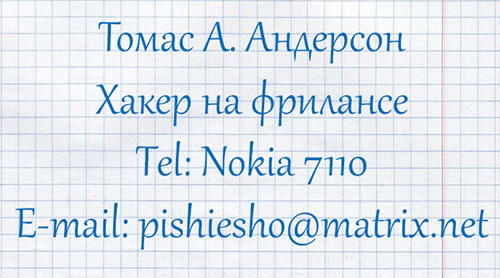
A terrible story happened - you forgot your business cards at home or they suddenly ended. What to do? Improvise!
First, you can write down your contacts (name, surname, company, position, email address, telephone number) on a piece of paper, carefully torn out of the notepad distributed at the event. The main thing - do it carefully and use the size as close as possible to the standard 5x9 cm business cards.
Secondly, you can ask your interlocutors to immediately write down your contact information to your phone or find and add you through social networks (Facebook, and better LinkedIn). You can reply to “plus one friend” right away at the event.
Thirdly, key conferences often have their own mobile application just for more convenient networking and communication. Some interlocutors can sometimes be reached only through them, the fear of personal communication also removes this, but more often it’s impossible to hope for some kind of breakthrough with the help of distance tools without real communication. This is only a way to consolidate an already held personal contact.
The same opinion about hash tags and posting to twitter. Yes, if you want to share interesting information with people, use social networks. But participants in events, especially IT-based ones, often get completely into virtual communication, and meanwhile, the most loyal future client or employee can literally sit next to them. Tear off your head from the phone!
Fourthly, having a business card scanner in your phone, you can scan the interlocutor’s business card and immediately send it your own business card to a recognized email address. If he, by a lucky chance, also has the same scanner - you can just share your business card via Wi-Fi right in the application. Once and ready.
3. Come early, go late
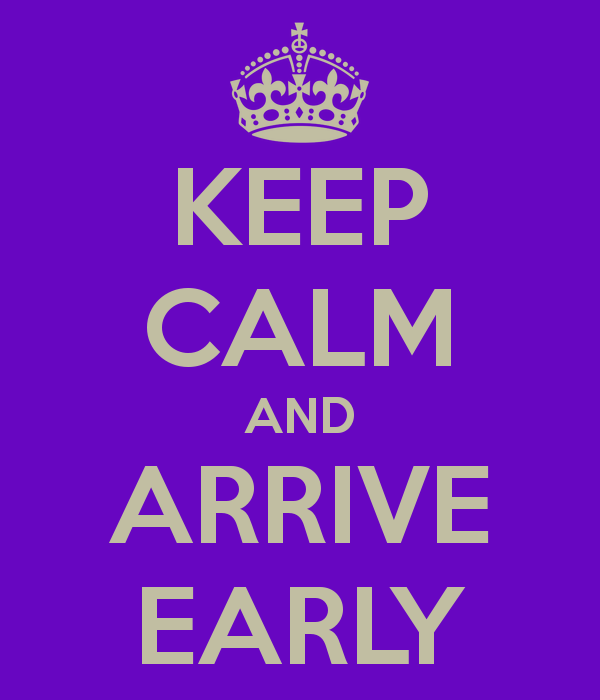
If you hate networking, you most likely hate parties with large crowds of people. And you are not alone. Devorah Zack, author of the book “Networking for Introverts”, says that introverts flourish when dealing with a small group of people, but rely on themselves in a crowd. The easiest life hack, how to avoid a crowd, is to come to the event early, when people are at a minimum.
As a first guest, you have a chance to talk one-on-one with several participants before starting the main fuss. You will also have the added bonus of creating a first impression before the interlocutors sink into the sea of business cards and handshakes. Perhaps you will have so many fruitful conversations in the first half hour that there will be no reason to remain at the whole event and eat snacks in “alone in the crowd”, hardly coping with bouts of demophobia.
The same applies to late departures. Sometimes the most interesting things happen at the very end: the closest contacts, the most interesting interlocutors, the most productive communication and valuable insights come after the main crowd subsides and people who are tired of the event will go home. Do not miss these opportunities, stay a little longer and you will have to wait for a reward.
4. Try to relax

This advice sounds very banal, but in fact networking is essentially friendly communication and the establishment of pleasant contacts with new people. This is not a telephone conversation with attempts to sell investments in Forex and not imposing Kirby vacuum cleaners on all neighbors, this is meeting new people. Some of them may eventually become your best friends, someone - an investor in your project, a new employer or partner, and someone, possibly, a future wife or husband. This is not a race for the number of business cards and dating, but the establishment of meaningful contacts.
Try to look energetic and smile. You may not immediately learn how to enjoy communicating with (so far) strangers, but imagine what it will be like for them to see your sour embarrassing mine. If you have no strength at all, go to the toilet and jump for 2 minutes. Seriously, it works! After this "operation" you can cheer up a dozen better cups of coffee.
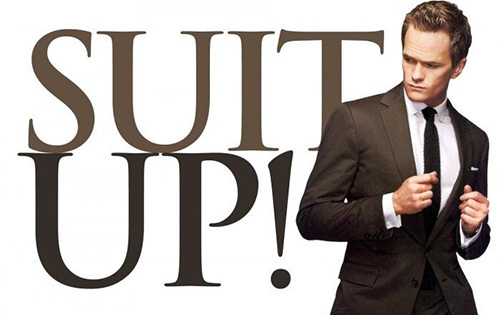
Dress confidently and professionally. You do not need to put on a strict suit and new shoes, and then hang around with a sad look, "well, it does not suit me!". Wear a shirt, an informal jacket and jeans, and you will already look stylish and comfortable, giving the impression of a "successful person." If a jacket doesn’t fit your image at all, dress comfortably, but spend at least 5 minutes on picking up jeans and t-shirts that people don’t feel ashamed of.
5. Set goals: the exact number of people to meet.

Even in spite of the masterful use of all the previous tips, you can still feel shy about communicating with strangers. This is the norm! You may be a savvy entrepreneur, a creative thinker, a talented programmer, but no one will know a bit about you if you can't even open your mouth!
There is a small life hack: set a goal for an event to talk to a certain number of people and stick to it no matter how things are going. If you promise yourself that you are going to talk to at least 10 new people, do not break your promise. Reward yourself with ice cream or an extra hour of Warcraft if you can keep your word.
Or take a friend with you and argue: the one who speaks with the smallest number of people and takes fewer business cards treats them to dinner. Having set a goal, you direct all the efforts of your consciousness and subconscious mind to something concrete, removing all obstacles and doubts on the way. Plus, once you reach the goal, you will have a real reason to leave!
6. Communication with one person and a group is different: do not be obsessive

If you see people standing alone, sadly looking into the distance (or vice versa inside themselves) or staring at smartphones - these are ideal candidates for communication! The whole view of this person says: “Well, come to me, someone, but I did not come to the event to read the tape of messages from people who are in a completely different place.” Despite the fact that introverts often need to take a break from the crowds alone, polite conversation for two minutes will not hurt anyone. Of course, first politely ask, for example, like this: “I will not disturb you? May I ask? .. "Or simply:" Hello, my name is Sergey, how do you like the event / reports / snacks? "
By the way, I can advise the book “How to talk to anyone. Confident communication in any situation ” , quite unobtrusively tells about different strategies just to eliminate the fear of communication.
If the person you are interested in is already talking to someone in the group, do not approach, pushing everyone and introducing yourself, this is unpleasant. Get close enough to get noticed, and just stand listening to the conversation. If you have something to say on the subject of the conversation, do not hesitate to use it. If not, wait, they will pay attention to you anyway and you will be able to join in the conversation.
In the ideal case, if someone you know is in a group of people, during a conversation, ask to introduce you. This method also works if you need to meet one person. If your friend knows the person you need, ask to introduce you and continue the conversation with a new interlocutor. This allows you to get a much deeper contact than self-acquaintance.
7. Be interested, not interesting

Interviewed events are often quite unpleasant for introverts, because we think that networking is about selling yourself and making deals. But it is not so! Networking is the building of relationships and its important part is sincere interest in the other side. This is where introverts can succeed.
If you are an observant and thoughtful person, you are probably an excellent listener. Use these skills. When you start a conversation, do not try to drown the interlocutor in the ocean of your business ideas or skills. Ask why they came to the event and do not immediately switch to yourself, dig deeper. Ask how they got into this business or to this position, what they like most of all in their work, what they have created or experienced over the last time. If you feel comfortable, ask about hobbies or family. This creates the right first impression!
After you have created some kind of relationship, it will be much easier for you to talk about yourself and your ideas. The interlocutors will be interested in you, because you were interested in them.
And one more tip: pay maximum attention to the interlocutor! If you ask a personal question, and then stir up the Facebook tape or look around for other people - you give a signal, “yes, it's really not interesting to me”. Only 2 minutes of 100% attention on a person is much better than a half-hour trip, on which you are constantly distracted!
8. First of all, think about how useful it is.

As I mentioned, in my opinion, networking is a completely opposite process to sales. If their goal is to sell what you have, to a person who does not need it (although it is possible and necessary), then the goal of networking is to help the person, give him what he needs in order to earn trust, and possibly get something then in return (but this is not an end in itself).
Think over first of all what you can give to people at the event YOU! What you can do, what you know, who you know. If you do not in any way intersect with the sphere of interests of the person you need, there is practically no chance of any kind of relationship. But do not think that if you are a student or a junior developer, you have nothing to offer the billionaire from the Forbes list or the main architect of Google. You can recommend an interesting book or article, give advice on the use of any IT service, or even advise a new music album or concert.
Prepare a short effective story-presentation (no more than 20 seconds). Needless to say, you are a bank manager or a Java programmer. It says absolutely nothing about you personally! Tell them that you are helping people fulfill their financial dreams or create programs that help millions of people recover faster.
9. Use social networks for real communication
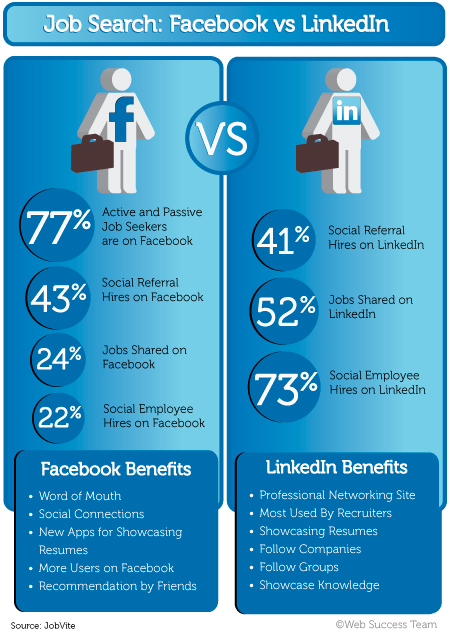
This advice is best suited for job seekers. Professional sites like LinkedIn or Professiona.ru are an amazing tool for finding the right people, but they are poorly suited for building real relationships that can lead to a job offer. For this you need “old-fashioned” meetings in person.
Start by finding professionals who work in the right field or occupy the desired position in the company. Most often they are on the 2nd or 3rd round of contacts (that is, acquaintances of your acquaintances). You can ask any of your “social friends” to introduce you, but even if this is not possible, write a personal letter about you, why would you like to add a person to your contacts. It is best to ask about their experience, to hear their "story". How did they get into this business? What interesting experience do they have? What advice can they give to someone who is trying to enter this professional field?
If you live in the same city, invite for a cup of coffee or lunch. If you live far away, ask permission to call or Skype. Do not talk about yourself, listen to their story, conduct an "interview". You do not need to ask if they have an open job, most often they will tell you about it. End the meeting by asking the names of other people with whom they will recommend to contact. Write a thank-you letter and, if necessary, ask to keep you informed about open vacancies and, if this is not perceived rudely, attach a link to your resume.
10. Remind yourself

Networking specialists speak with one voice about one thing: if you don’t remind yourself, you lose your contacts with such difficulty. The generally accepted opinion of networking guru Keith Ferrazzi (author of the book “Never Eat Alone”): you must write by e-mail, SMS, through social networks or call within 48 hours after the first meeting. But how not to be imposed, and to be useful?
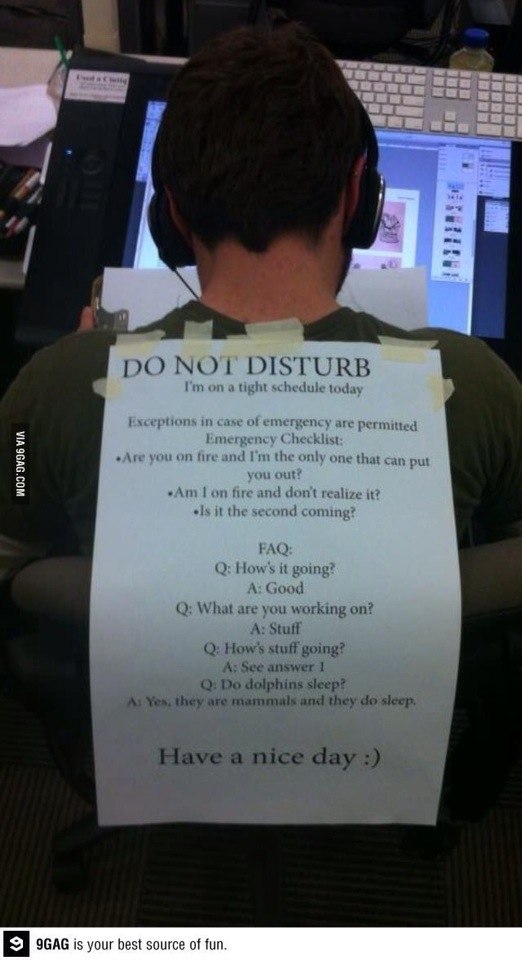
The best way to overcome the awkwardness of subsequent contact is to make it as natural as possible. If you are a good listener and paid maximum attention to your interlocutor (and I suppose you took advice # 7 seriously), you will not have any problems with further communication, because you remember that Vasya is interested in personal development books, Masha is engaged in self-assembly industrial robots on Arduino, and Peter is looking for an application for meditation. (If you have memory problems - make notes on the business cards of the interlocutors after the conversation).
If you really want to build relationships, do not send impersonal “nice to meet” by email. Find something that will be useful for people: a review of a recently published book on personal development, a rare collection of sensors for Arduino on eBay or a link to a program you need for Pete with a description of how you use it as efficiently as possible. Then your letter will not be self-advertising, but a really valuable message, and you will make a good impression. And if you get an answer, and the person you are really interested in, suggest that you meet at a cafe in the week.
In general, the main advice: at the next event, tear yourself away from the phone, really get interested in the people around you, be friendly and helpful, have fun and you will not notice how your life has changed drastically thanks to networking.

Used materials
www.ozon.ru/context/detail/id/6094381
www.ozon.ru/context/detail/id/18053051
vk.com/typicalintrovert
pronetworking.ru
www.businessknowhow.com/tips/networking.htm
www.lifehack.org/articles/work/10-business-networking-tips-grow-your-professional-network.html
www.huffingtonpost.com/news/networking-tips
money.howstuffworks.com/business/professional-development
prosperityplace.com/10-effective-business-networking-tips
career-advice.monster.com/job-search/professional-networking/improve-quality-of-your-networking/article.aspx
gnm-may.ticketforevent.com/ru/home/7697
www.ozon.ru/context/detail/id/18053051
vk.com/typicalintrovert
pronetworking.ru
www.businessknowhow.com/tips/networking.htm
www.lifehack.org/articles/work/10-business-networking-tips-grow-your-professional-network.html
www.huffingtonpost.com/news/networking-tips
money.howstuffworks.com/business/professional-development
prosperityplace.com/10-effective-business-networking-tips
career-advice.monster.com/job-search/professional-networking/improve-quality-of-your-networking/article.aspx
gnm-may.ticketforevent.com/ru/home/7697
Source: https://habr.com/ru/post/258419/
All Articles